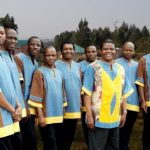I recently interviewed a founding member of the South African vocal group Ladysmith Black Mambazo who told me the band started as a dream – see excerpt below. The band plays March 2 at Napa’s Uptown Theater – here’s the excerpt:
Mambazo’s music, a hybrid of Zulu harmonies and gospel stylings, came to the group’s founder, Albert Shabalala, in a series of dreams in 1964.
“In the dreams, he heard the blending of voices and saw how to put the singing together with the dancing,” Mazibuko said. The musical style is called Isicathamiya, a Zulu word meaning a harmonious blend of voices.
In the mid-1960s, Shabalala was in a singing group in Durban, but they couldn’t realize the music he heard in his dream. So he invited his brother, his cousin Mazibuko and others to sing with him.
Mambazo’s music is spiritual, says Shabalala, 71, on the group’s web site, but not specific to any religion: The songs “evoke enthusiasm and excitement, regardless of what you follow spiritually.”
Where does the group’s name come from? Ladysmith is Shabalala’s home town, Black is a reference to the black ox which is known for its strength, and Mambazo is the Zulu word for axe, a symbol of the group’s ability to defeat rivals in singing competitions.
Mambazo’s most recent album, last year’s “Songs From a Zulu Farm,” brings to life the music of the band members’ pastoral childhood. Nominated for a Grammy this year, the album is ideal for kids, but the songs appeal to adults, too.
“This is a very happy album,” Mazibuko said. “It brings a lot of joy because when you are a child you … just see the world with eyes of beauty. It shows the power of music, what the music was doing to us even when we were little kids. We want to wake up the children inside us.”
One song on the album didn’t come from the Zulu tradition. When Mambazo recorded the album, they asked about American farm songs. Their grandsons knew “Old McDonald,” and the band translated the song into the Zulu language.
For the full story in the Press Democrat, click here.


